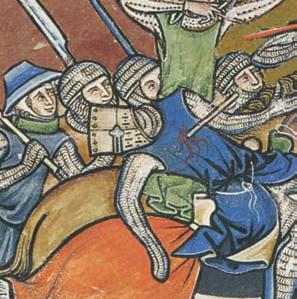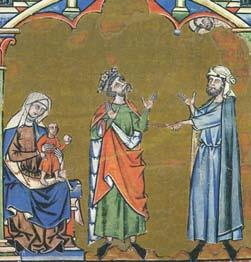
4 minute read
Two Voiceless Prophets
By Rev. Tim Lorenz
Do you remember the story of David and Bathsheba? David and Bathsheba sinned by committing adultery. The punishment for doing so was death—the man and the woman who were caught in adultery were to be stoned. In their sin, Bathsheba became pregnant by David, and they were about to be caught. Everyone would know what they had done—unless it was covered over. And so, in order to spare their lives, the king sent the righteous man, Uriah, to his death— the innocent husband being slaughtered so that his adulterous bride would live. The sin was covered over. Bathsheba would not die. No one would know about this sin—no one, that is, except God.
Advertisement
God then sent His prophet, Nathan, to confront David, and David confessed his sin, saying, “Create in me a clean heart, O God, and renew a right spirit within me” (Psalm 51:10). Having confessed his sin, David received forgiveness, but at what cost? “David said to Nathan, ‘I have sinned against the Lord.’ Nathan replied, ‘The Lord has taken away your sin. You are not going to die. But… the son born to you will die.’” (2 Samuel 12:13-14). There is no mistaking what the prophet Nathan was saying. Because of David’s sin, his son will die. Because of Bathsheba’s sin, her righteous husband died. Sin leads to death.

Scripture firmly teaches that specific sins do not lead to specific punishment (Think Job or the blind man in John 9). How then do we fully explain the death of David’s son? How then do we explain the death of Bathsheba’s husband? David repented, his son dies for a sin he did not commit, and we say that this is not a punishment?
There is something else going on in this text, and it comes to light when we sing the Lenten hymn, “Stricken, Smitten and Afflicted.” The following are a few verses from the hymn:
God, and renew a right spirit within me” (Psalm 51:10). Having confessed his sin, David received forgiveness, but at what cost? “David said to Nathan, ‘I have sinned against the Lord.’ Nathan replied, ‘The Lord has taken away your sin. You are not going to die. But… the son born to you will die.’” (2 Samuel 12:13-14). There is no mistaking what the prophet Nathan was saying. Because of David’s sin, his son will die. Because of Bathsheba’s sin, her righteous husband died. Sin leads to death. do not lead to specific punishment (Think Job or the blind man in John 9). How then do we fully explain the death of David’s son? How then do we explain the death of Bathsheba’s husband? David repented, his son dies for a sin he did not commit, and we say that this is not a punishment? text, and it comes to light when we sing the Lenten hymn, “Stricken, Smitten and Afflicted.” The following are a few verses from the hymn:
1. Stricken, smitten and afflicted See Him dying on the tree! ‘Tis the Christ by man rejected; Yes my soul, ‘tis He, ‘tis He! ‘Tis the long expected Prophet, David’s Son, yet David’s Lord; Proofs I see sufficient of it; ‘Tis the true and faithful word 1.
3. Ye who think of sin but lightly Nor suppose the evil great Here may view its nature rightly, Here its guilt may estimate. Mark the sacrifice appointed, See who bears the awful load; ‘Tis the Word, the Lord’s anointed, Son of Man and Son of God.
Look and see who Jesus is in this text— David’s son and David’s Lord! This sobering hymn reminds us of this: Because of sin, the Son of David died.
“You are not going to die. But…the son born to you will die.” These are the words spoken by Nathan to David, but they are not a judgment against David—they are a judgment a against David’s Son—Jesus.

Because of David’s sin, Jesus would die. The words God speaks through Nathan the prophet are not words of judgment, but they are beautiful words of Gospel. David lives while his Son, God’s Son, dies for that sin.
The son born to David did indeed die, but his death served a prophetic purpose. Though He did not speak a single word in his short life, by his death, he pointed David forward to the Son who would be punished for his sins and the sins of all: Jesus. David lives. Jesus died.
In the same way, Bathsheba’s righteous husband died as a prophet. In order that Bathsheba would live, in order that his wife’s adultery would be covered over, the king of Israel put Uriah to death. Uriah’s innocent death covered the sin of his adulterous wife completely, and so Uriah died as a prophet—his life the silent testimony pointing forward to Jesus, who would die, so that His sinful bride would live.
When bad things happen to you, beware of thinking that they are a judgment resulting from a specific sin. Without a specific Word from God that says, “This is your punishment,” it is dangerous to think God is punishing you for a particular thing you have or have not done.
God’s punishment and wrath were poured out upon Jesus so that you would not die, but that you would live. When bad things happen, you are reminded to repent of your sin, but these bad things also point you to the death of Jesus on the cross, and are a reminder of God’s love for you in Christ Jesus. You are forgiven, now and forevermore, just as the two voiceless prophets preach. Amen.
Rev. Tim Lorenz joyfully serves the saints of Bethlehem Lutheran Church at Greenleaf, Kansas. He has been married to his wife, Kristin, for 6 years and is the father of 2 children. He can be reached at pastorlorenz@gmail.com









